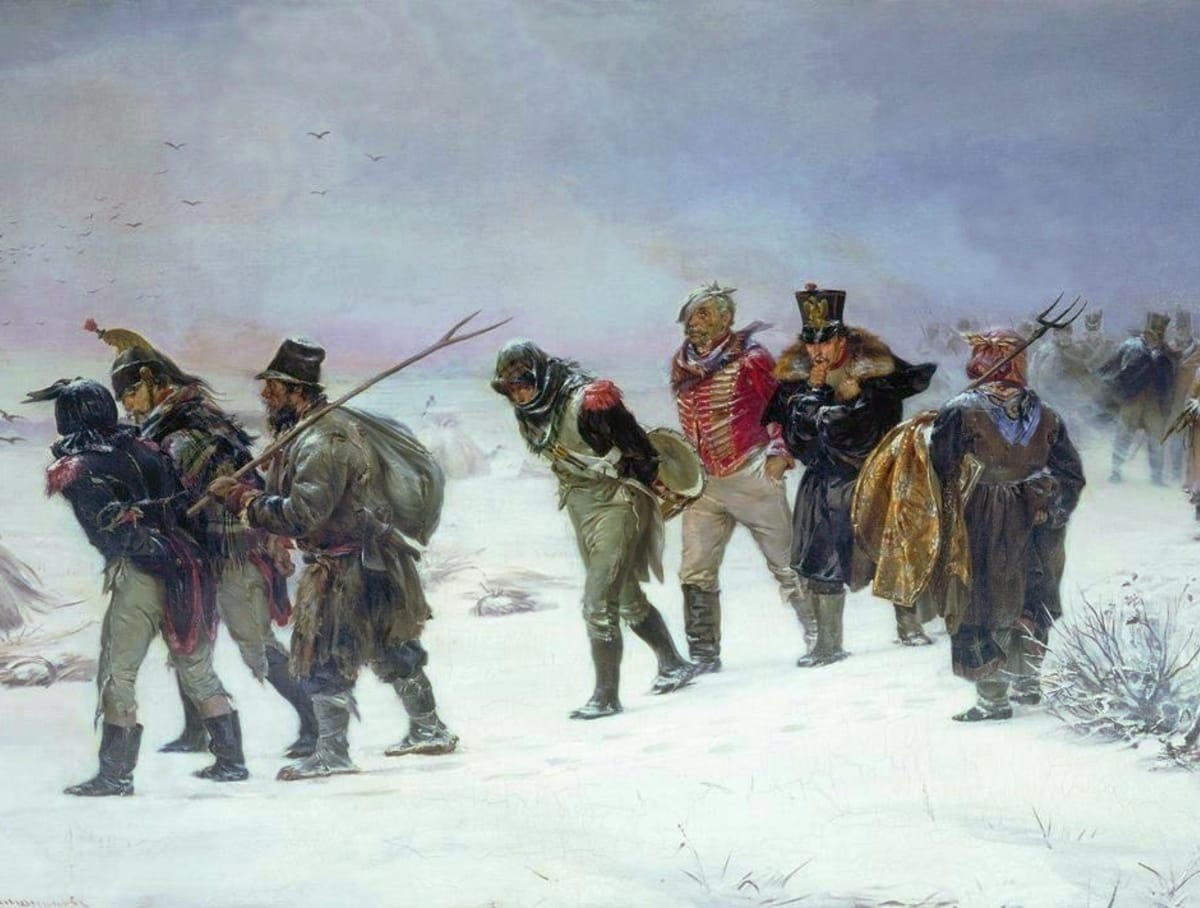Often you can find the statement that many familiar words and expressions of the Russian language have French roots - for example, the words “trash” and “chantrap”. We decided to check the most common examples.
Schwal
The legend of the French origin of the word "trash" can be found in Blogs, and c Mediawho from time to time publish collections with such borrowings. Most often, this story is presented as follows: in 1812, those who were fleeing from Russia, who had had the French, begged for the peasants at least some food, without disdaining Konina. In French, the horse is Cheval (it is from this word that the title of Chevalier comes), and they seemed to ask: “Cheval, Cheval”. From this, the contemptuous "trash" allegedly came. This is confident He wrote And the former Minister of Culture, and now the adviser to the President of the Russian Federation Vladimir Medinsky in his book "About who composed myths about Russia."
“Our brother, that is, and Rogozhin, he, of course, is inclined to honor the blot, and maybe deservedly.”
F. Dostoevsky, "Idiot"
The French origin of the word is often confirmed by an example from memoirs The poet Anton Delvig: “Smirnov, like many of the then society, spoke French in French. He was a hunter to the horses and often used the word Cheval, which he pronounced badly, so Tsurikov told him: "You yourself are a trash!" " But this is rather a pun, and the real story of the word is completely different.
In the "Explanatory Dictionary of the Living Great Russian Language" by Vladimir Dahl Given Not only the meaning of the word “trash” (shusher, bastard or rabble, crafty people), but also contains a reference to the origin from the verb “sew”. In the "etymological dictionary" of the Fasmer, the most complete reference book of the origin of words, this issue illuminated Read more. Several versions of foreign origin are discarded by the author. There is both a French version (from Cheval, literally a “horse”, colloquial “bastard”, “rude”), and German (from Schwall, “swollen mass”), and even a version of the origin of the word on behalf of a certain Novgorodian Ivashka Shval. The last example should dwell in more detail. Ivashka Shval is mentioned in the Novgorod III annals, monument of the XVII centuryknown to us from the lists of the 18th century. It contains story About the capture of Novgorod by the Swedes in 1611. And the main traitor was just the mentioned Ivashka Shval. The most convincing version in the Fasmer dictionary is the origin of the noun from the verb “sew”. The word "trash" is formed according to the same model as, for example, "Koval" (blacksmith) from "forge", and initially meant the profession of a tailor. Obviously, someone in the family of a traitor-Novgorod was a tailor-hence his surname, who was either his own nickname, or a nickname of one of the ancestors.
Thus, the word "trash" has nothing to do with the French "Chevalier" and to other derivatives from Cheval.

Not true
Sharomyman
The story of the word "spherical man", meaning a crook and a deceiver, usually Turned out With the legend of the expressions that came with the war of 1812. “Being at least to eat at least something, the French turned to the peasants as their best friends, namely they said:“ Cher ami ”, which means“ dear friend ”. So, constantly hearing "Cher Ami, Cher Ami, Cher Ami", Russian peasants and nicknamed the French beggars - "Sharomins". " This version has Vladimir Medinskyand on the website of the magazine "Amateur".
“He was already on the stairs, when suddenly at the very nose, it was not known where, an amazing urban size grew up, and in the ears it was unpleasantly sounded:“ And where are you, Sharomoiga, climb? ”
M. SALTYKOV-Shchedrin, "confusing business"
The dispute about the origin of the word "Sharomyg" has been going on since the end of the 19th century. In the journal "Philological Notes" for 1889 there is article The famous linguist Ivan Zheltov, in which he indicates the French history of the word. According to him, the “Sharomomyg” is “the product of the French phrase of Cher Ami (my dear friend), which is rooted on Russian soil at the end of the 18th century.” But there is a note to the same article editor of the magazine Alexei Khovansky. He, in turn, believed that the expression was associated with a jargon “ball”, that is, for nothing. Compare with the modern expression "on the ball." In the future, both options existed in parallel, and there is no consensus on this issue. In the Fasmer dictionary indicatedthat the French hypothesis is possible (as an option - from the appeal borrowed from the torn retreating soldiers of the army of Napoleon in 1812), and the Slavic (from the "ball").

This is not for sure
Shusher
All in the same Collections The word “shusher”, meaning a rabble, a worthless person or some kind of trash, is also about the French origin of Russian words. This is another branch of the story about the retreating French: when they asked where they were going, the French muttered: “Chez Chérie,” that is, “to their beloved”. So allegedly, the consonant word “Shusher” arose.
“Not a shusher-artists, and students, and double-war Senate officials, and people who needed a bottle of Medoku and some special befsteke.”
T. Shevchenko, "Artist"
The word "Shusher" is found in the texts before the French began to retreat. For example, in the same 1812 in one of campaign posters The Moscow mayor Fyodor Rostopchin is indicated: “When you think that the spy, well, lead to me, and do not hit and do not complain to the Russians; The army should bury French, not shusher to knock the eyes. ” This is the ninth poster in a row dated September 9, 1812. At this time, the French were in Moscow and were not going to go anywhere yet. A word comes across earlier - for example, in correspondence future Decembrist Nikolai Turgenev for 1811. IN Fasmer dictionary The French origin of the word is not even considered. The version of the kinship with the Middle Ages of the Emass Schar ("crowd") also decisively deviates. Researchers give several dialect forms (“shusher”, “Shushar”, “Shushal” and “shusell”), but consider the origin of the word unclear. However, the French version is definitely false.

Not true
Chantrap
The word "chantrap" (insignificant, worthless person, crook) is often considered French by origin - they write about this in Blogs, and c Media. According to this version, the “chantrap” comes from the French Chantera Pas (“will not sing”) and was used when the children were selected in the landowner choir. Sometimes they also write that French tutors were selected for children, and therefore they carried out a verdict in French.
“I did not count Otov and I do not want to count. But I see one thing - if you are so, which means that you have no respect for the owner of the house. I say again: who are you? Beggar, chantrap, tear brown ... "
M. Gorky, "bourgeois"
French version of the origin of the word Given In the "Explanatory Dictionary" of Ushakov. However, there is no convincing evidence of this hypothesis. In the Fasmer dictionary indicated The widespread spread of the word in Russian dialects, and the version of the Czech Slavist Antonin Matsenauer is advanced as the most likely: he I thoughtthat the "Chantrapa" has a common Slavic origin. He quotes the ancient Chersho analogue of the word “deceiver” - Šantrok (šantroch) - and leads him to the Middle Ages Santrock (“deception”). This version looks more convincing, given the distribution in dialects, which could hardly appear as a result of private stories of children's selection in the choir.
Most likely not true
Kryochka with Masherochka
“Scroll with Masherochka” - the so -called faithful inseparable friends. And the expression, according to a common version, came from female guesthood, whose pupils turned to each other “Ma Chère” (“My dear”). The phrase arose because the institutions danced with each other due to the lack of men in educational institutions. Many media write about this - from the educational site "Chalk»To the entertaining Fishki.net.
“The sister danced perfectly, but always remained unhappy.
“You are a very clever gentleman, Alyosha,” she said, “but, you see, you are still a brother, not a man.” With you, I, like at the institute, is a rough with a masherochka. ”
A. Kuprin, "Junker"
In the Fasmer dictionary, the word "rough" noted As invariably accompanied by the words "with Masherochka." However, in some texts of the XIX century, it can Meet And separately in the form of the usual appeal “Dear”, Ma Chère or Chérie. But the expression “Sherochka with Masherochka” really comes from the traditions of female boarding houses. Ma chère means literally “my dear”. And in the boarding houses, and, in particular, at the Smolny Institute, balls with the participation of invited gentlemen were a rarity. For example, Lydia Charskaya writes about this in “Notes from Institutes”: “They made a Christmas tree, a ball was arranged, where the institutes were not dancing“ Sherochka and Masherochka ”, as was usually accepted, but with real gentlemen sent to such balls along the corps and schools, and sometimes with the brothers invited by the pupils themselves, cousins and simply cousins and simply cousins and simply acquaintances. " In this case, etymology is not questioned by any of the researchers.
Is it true
If you find a spelling or grammatical error, please inform us of this, highlighting the text with an error and by pressing Ctrl+Enter.






